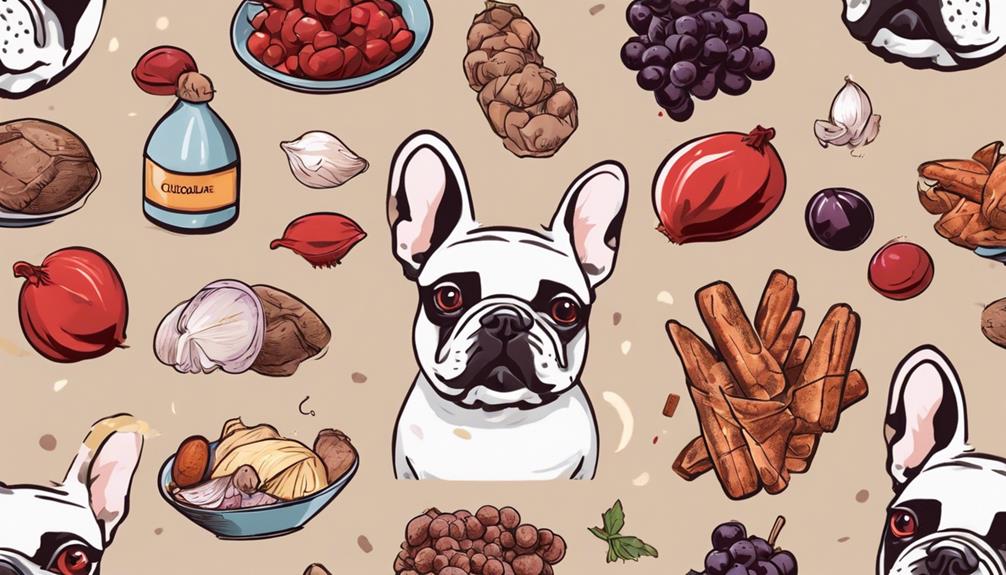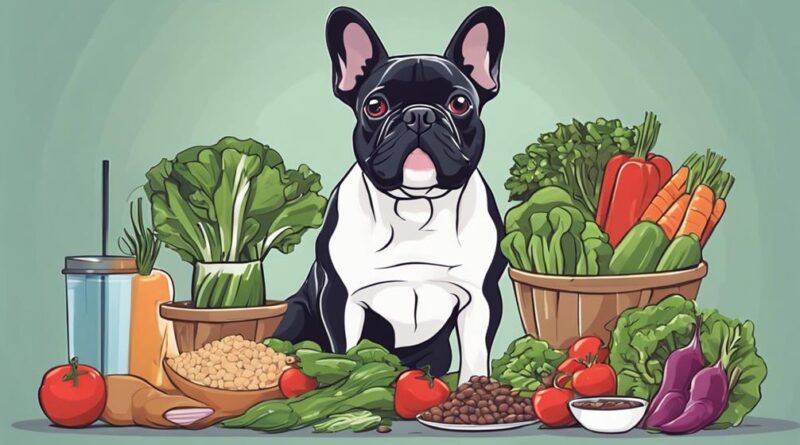Six Top Tips for a Healthy French Bulldog Diet
Are you certain your French Bulldog is getting the best diet possible? While you may think you're providing the right food, there are key tips to consider that could make a significant difference in their health and wellbeing.
From understanding their macronutrient needs to avoiding harmful foods, these six top tips will help you navigate the world of French Bulldog nutrition effectively.
Make sure your furry companion is thriving with a diet tailored to their specific requirements.
Importance of Balanced Nutrition
To ensure optimal health and well-being for your French Bulldog, it's crucial to provide a diet that's nutritionally balanced. Macronutrient ratios play a significant role in meeting your furry friend's dietary needs. These ratios refer to the proportions of carbohydrates, proteins, and fats in your dog's diet. For French Bulldogs, a balanced diet typically consists of around 18-20% protein, 5-8% fat, and 50-55% carbohydrates. These ratios can vary based on your dog's age, activity level, and health status, so it's essential to consult with your veterinarian to determine the most suitable ratios for your specific pet.
In addition to macronutrient ratios, incorporating nutritional supplements into your French Bulldog's diet can further enhance their overall health. Supplements like omega-3 fatty acids can help improve your dog's skin and coat health, joint function, and overall immune system. Probiotics are another beneficial supplement that can aid in digestion and promote gut health. However, it's crucial to consult with your vet before introducing any new supplements to ensure they're safe and appropriate for your French Bulldog.
Understanding Macronutrient Needs
Understanding your French Bulldog's macronutrient needs is essential for ensuring they receive the right balance of carbohydrates, proteins, and fats in their diet to support their overall health and well-being.
When it comes to protein requirements, French Bulldogs, like all dogs, need a sufficient amount of high-quality protein in their diet to maintain muscle mass, support immune function, and overall growth and development. Proteins are made up of amino acids, which are the building blocks of cells, tissues, enzymes, and hormones. Look for dog foods that list a quality protein source, such as chicken, beef, or fish, as the first ingredient.
In addition to proteins, the fat content in your French Bulldog's diet is also crucial. Fats are a concentrated source of energy and provide essential fatty acids that support skin and coat health, as well as the absorption of fat-soluble vitamins. However, it's important to monitor the amount of fat your French Bulldog consumes, as excess fat can lead to obesity and related health issues. Opt for dog foods with moderate fat levels from healthy sources like fish oil or chicken fat.
Choosing High-Quality Dog Food
When selecting dog food for your French Bulldog, prioritize high-quality options rich in essential nutrients to support their health and well-being. Start by examining the ingredient sourcing and nutritional content of the dog food. Look for real meat as the first ingredient, avoiding fillers like corn or by-products. High-quality dog foods often contain a balance of protein, healthy fats, carbohydrates, vitamins, and minerals necessary for your Frenchie's overall health.
Consider the meal frequency and feeding schedule while choosing dog food. French Bulldogs are prone to obesity, so it's crucial to feed them the right amount at the right times. Typically, adult Frenchies do well with two meals a day, while puppies may need more frequent feeding. Adjust the portion sizes based on your dog's activity level and weight management goals.
Opting for premium dog food may seem pricier, but in the long run, it can contribute to your French Bulldog's well-being and potentially save you money on vet bills. Remember, investing in high-quality dog food now can lead to a healthier and happier pup in the future.
Incorporating Fresh Fruits and Vegetables
Consider enhancing your French Bulldog's diet by incorporating fresh fruits and vegetables to provide additional nutrients and variety. Including these in your Frenchie's meals can offer a range of health benefits and keep mealtime exciting for your furry friend.
Here are some tips to help you incorporate fruits and vegetables into your French Bulldog's diet:
- Nutrient-rich treats: Use fruits and vegetables as healthy treats for your French Bulldog. For example, you can offer blueberries, apples, carrots, or green beans as rewards during training sessions or as a snack between meals.
- Creative recipes: Experiment with different recipes that incorporate fruits and vegetables into your French Bulldog's meals. You can mix finely chopped spinach or sweet potatoes into their regular food, create homemade frozen treats using blended fruits like bananas or strawberries, or bake dog-friendly vegetable muffins.
- Balanced portions: Remember that fruits and vegetables should complement your French Bulldog's primary diet, not replace it entirely. Ensure that these additions make up only a small portion of their overall food intake to maintain a balanced diet.
- Consult with your vet: Before making any significant changes to your French Bulldog's diet, consult with your veterinarian to ensure that the fruits and vegetables you plan to incorporate are safe and suitable for your dog's specific dietary needs.
Hydration and Water Intake
To ensure your French Bulldog stays properly hydrated, provide access to fresh, clean water throughout the day. Hydration is crucial for your furry friend's overall health and well-being. Make sure the water bowl is always filled with clean water and easily accessible to your French Bulldog. Regularly check the water bowl to ensure it's clean and replenished.
Monitoring your French Bulldog's water intake is essential. Keep an eye on how much water your dog is drinking daily. Changes in water consumption can sometimes indicate underlying health issues, so it's important to track this. If you notice a significant decrease or increase in water intake, consult your veterinarian for guidance.
French Bulldogs can be prone to dehydration, especially in hot weather or after vigorous exercise. Therefore, it's vital to encourage your dog to drink water regularly. You can also offer wet food or add water to dry kibble to help increase their overall water intake.
Managing Portion Control
Ensure your French Bulldog maintains a healthy weight by carefully managing their portion control. Proper portion control is crucial for keeping your furry friend at an optimal weight and ensuring their overall health and well-being.
Here are some essential portion control tips and weight management strategies:
- Use Measuring Cups: Measure your French Bulldog's food portions using a standard measuring cup to avoid overfeeding.
- Follow Feeding Guidelines: Adhere to the recommended feeding guidelines provided on your dog food packaging based on your Frenchie's weight and activity level.
- Avoid Free Feeding: Refrain from leaving food out all day for your French Bulldog to nibble on. Instead, establish set meal times.
- Monitor Body Condition: Regularly assess your French Bulldog's body condition score to ensure they're at an ideal weight. Adjust portion sizes as needed to maintain a healthy weight.
Avoiding Harmful Foods

Regularly check the ingredients list of any food or treats you offer your French Bulldog to avoid feeding them harmful foods. This is crucial in preventing food allergies and maintaining your Frenchie's digestive health. Some common foods that can be harmful to French Bulldogs include chocolate, grapes, raisins, onions, garlic, and foods high in fat content. These items can cause digestive issues, toxicity, and other health problems in your furry friend.
Food allergies aren't uncommon in French Bulldogs. Be mindful of potential allergens such as grains, certain proteins (like beef or chicken), dairy, and artificial additives. If you notice any signs of food allergies like itching, gastrointestinal problems, or skin irritations, consult your veterinarian to determine the best course of action. Avoiding known allergens can help keep your French Bulldog healthy and happy.
Maintaining good digestive health is essential for your French Bulldog's overall well-being. To promote healthy digestion, opt for high-quality dog food that's specifically formulated for French Bulldogs. Avoid foods with excessive fillers, artificial ingredients, or unknown meat by-products. Additionally, ensure your Frenchie has access to fresh water at all times to aid in digestion and prevent dehydration.
Regular Veterinary Check-Ups
Make sure your French Bulldog receives routine check-ups from a veterinarian to maintain their health and well-being. Regular veterinary check-ups are crucial in keeping your furry friend healthy and happy. Here are some key reasons why these check-ups are essential:
- Preventing Obesity: Regular check-ups can help monitor your French Bulldog's weight and body condition. The vet can provide guidance on a suitable diet and exercise routine to prevent obesity, which is common in this breed.
- Dental Care: Your vet will also assess your French Bulldog's dental health during check-ups. Dental issues can lead to various health problems, so it's important to address them early. The vet may recommend dental cleanings or specific dental care routines.
- Early Detection of Health Issues: Through regular check-ups, potential health issues can be identified early. This allows for prompt treatment and management, improving your French Bulldog's quality of life.
- Vaccination and Preventive Care: Vaccinations and preventive medications are vital in safeguarding your French Bulldog against various illnesses. Your vet will ensure that your pet is up to date on vaccinations and recommend preventive care measures tailored to your dog's lifestyle.
Frequently Asked Questions
Can French Bulldogs Be Fed a Vegetarian or Vegan Diet?
You should avoid feeding French Bulldogs a vegetarian or vegan diet due to ethical considerations and nutritional adequacy. These diets may lead to digestive issues and behavioral impacts in your furry friend. French Bulldogs require a diet rich in animal proteins and nutrients to maintain their health and wellbeing.
It's essential to prioritize their unique dietary needs to ensure they thrive and lead a happy life.
How Often Should Treats Be Given to French Bulldogs as Part of Their Diet?
When it comes to giving treats to your French Bulldog as part of their diet, remember to consider training rewards and special occasions.
It's important to find a balance so as not to compromise their dietary restrictions or health concerns. Treats can be a great tool for training, but moderation is key.
Keep an eye on their overall calorie intake and make sure treats are given thoughtfully to maintain a healthy diet for your furry friend.
Are There Any Specific Supplements That Are Recommended for French Bulldogs?
When considering specific supplements for French Bulldogs, it's essential to focus on providing them with the necessary vitamins, minerals, and balanced protein sources.
Incorporate supplements that support their overall health and well-being. Look for options that cater to their specific needs and promote a balanced diet.
What Are Some Common Food Allergies in French Bulldogs to Watch Out For?
When it comes to French Bulldogs, it's important to be aware of common food allergies that can lead to food intolerance and digestive issues. Some ingredients like grains, dairy, and certain proteins may trigger allergic reactions.
Keep an eye out for symptoms like itching, skin rashes, upset stomach, or diarrhea, as these could indicate a food allergy. Monitoring your bulldog's diet closely can help you pinpoint and avoid problematic ingredients.
How Can I Tell if My French Bulldog Is Overweight and in Need of a Diet Change?
If your French Bulldog is overweight, you can tell by observing their body shape and feeling for excessive fat. To manage their weight, focus on a balanced diet and regular exercise.
Monitor their health closely and consult with a veterinarian for guidance on a proper diet plan and exercise routine.
Conclusion
Now that you know the top tips for a healthy French Bulldog diet, you can ensure your furry friend stays happy and healthy for years to come.
Remember to provide a balanced diet, incorporate fresh fruits and vegetables, manage portion control, and avoid harmful foods.
Regular veterinary check-ups will also help monitor your Frenchie's health and ensure they're getting all the nutrients they need.
Keep up the good work and watch your pup thrive!
